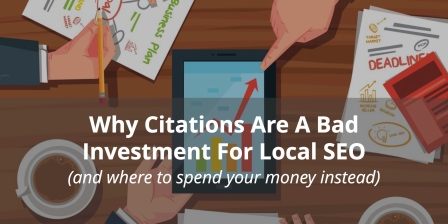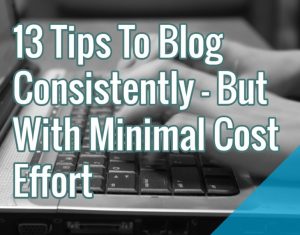October 3, 2016
Citations and Business listings are a huge part of local SEO.
They help Google understand where your business is, what it’s about, and who to show it to in search results.
But many SEO companies also use citations and business listings as a way to have their clients overpay for additional work that garners diminishing results.
In this article, I’m going to break down why local businesses don’t need hundreds of citations in order to rank.
I’m also going to tell you how many citations you do need, what to spend your local SEO budget on, and more.
Let’s get started.
Why You Need Local Citations
A citation is a mention of your business’s local information on another website.
This includes your name, address, and phone number (NAP):
Some citations include a link back to your website, but many don’t. So it’s not the same as link building.
Search engines like Google and Bing use citations as a ranking factor in their algorithms when people search for local businesses and services.
Citations from trusted directories, like Yellow Pages and SuperPages, increase the search engines’ certainty that you are a real business operating in that area.
But most importantly, they tell search engines what your contact information is and what your business is about.
Since search engines want to show the most relevant correct results to their users, this is important information:
If search engines can’t verify this information about you, they don’t want to display you in their results.
And if you don’t have a website where Google can get this information, which is typical of less competitive local niches, having citations on other websites is even more important.
The Amount of Business Listings and Citations You Need (And Where to Get Them)
Contrary to popular belief, you don’t need hundreds of business listings (citations) in order to rank your business on the first page.
You can certainly get hundreds if you would like to. It won’t hurt your rankings, but it won’t help them either.
In my experience with our clients, a local business only needs the top 20 to 40 business listings.
Above that, there are diminishing returns in terms of ranking power.
Now figuring out the best citations may be easier said than done. If you take a look at the chart below your head probably starts to spin.
If you take a look at the chart below your head probably starts to spin:
However, it is paramount you get those top 20 to 40 citations because they help search engines to start building trust in you and shows you are a real business.
Also, all else being equal, if Google looks at a business with citations and one without, they will favor the one with citations.
Make sure you are listed in places like Google My Business, Yelp, Yellow Pages, and a couple local directory listings (like the Chamber of Commerce).
Moz has also put together a page to see the best citations to get per city to help you out.
Where to Spend Your Local SEO Budget
Here’s my gripe with a lot of SEO companies out there:
Many of them say that every citation you have must be perfect down to the dot.
That is, your listings should be exactly same, and if some of them say “St.” instead of “Street,” this must be changed.
This could mean hundreds of listings require editing, and some SEO companies base their entire offering around this service.
We say Google is smart and can understand what a website page or post is about, but we don’t think they understand the difference between “St.” and “Street”?
Hard to believe…
In working with our clients, “fixing” menial parts of each listing like this has had zero impact on rankings.
Just like having hundreds of citations, this won’t hurt your business’s visibility in Google and other search engines.
It just won’t help it.
And if you’re paying an SEO company to do this for you, you may be wasting part of your marketing budget.
Building Citations May Be a Waste of Your Marketing BudgetClick To Tweet
Now, if your business’s address changes, all of your listings do need to be fixed.
Each listing must have the correct address in order for people who find you on Google to find you in real life.
And if Google finds discrepancies in your citations around the web, it may be hesitant to rank you.
Note: Here’s another reason to only go after the top citations. It’s a lot easier to alter 40 citations when you change your address, phone number, or business name than 200 of them.
But especially if you’re in a competitive niche, fixing small parts of each listing so they’re all exactly the same won’t help you rank higher.
Instead, once you have the top 20 to 40 citations, you should focus your local SEO budget on something much more important:
Backlinks.
Specifically, backlinks from high authority domains that are relevant to your local area, your niche/industry, or both.
This is where you want to spend your SEO budget.
Many local businesses don’t focus on link building, and very few even know what it is.
And the companies they’re working with are probably busy fixing their listings rather than building links.
So this is where many local businesses can soar past their competition in search engines.
If there was one huge opportunity in local SEO, I would say this is it.
Like it has been since Google’s inception, backlinks remain one of the top ranking factors for any business or website.
Link building is the hardest and most costly part of SEO, but even if you did everything else wrong, the right backlinks would get you ranked.
As this study from Local SEO Guide suggests.
Citations are a Commodity in Local SEOClick To Tweet
Most businesses have them, so they aren’t a big enough defining factor in Google’s eyes.
Backlinks are a defining factor
If your SEO company is getting you hundreds of citations or fixing small parts of each one, ask them to defer those efforts to building high quality, relevant backlinks.
If you’re in a competitive niche, which is true for many local businesses, have them do this ASAP.
The Disconnect in Current Local SEO “Best Practices”
Current local SEO best practices have a detrimental fixation on citations.
Citations do have a positive impact on your rankings, but they’re relatively easy to get and you can get a ton of them, which some SEO companies use as a facade to clients that they’re doing a lot of work.
I think this is a ripoff. Don’t get duped by your SEO company.
Local SEO needs to continue focusing on citations (the top 20 to 40), but also on:
- Backlinks
- Content
- Website optimization
Backlinks provide the authority you need to rank above your competitors, but content and website optimization provide the relevancy.
They tell Google who you are, what you do, who you do it for, and what keywords you want to rank for.
Here’s a great chart showing where you need to spend your SEO marketing dollars:
Image courtesy of Local SEO Guide
The more links you have to your website and your content, the more Google will see your business as trustworthy and high quality.
Your content also helps educate your audience to do business with you.
And if you optimize it correctly, you can rank for long tail keywords in your local area.
The main pages of your website should also be strategically optimized to rank for local keywords.
When people search in Google for local businesses, they’re searching for keywords like “best Asian restaurant Atlanta” and “Atlanta car repair.”
Your SEO company should make sure each page and piece of content is correctly optimized to send as much business as possible your way.
Over to You
Local search results can be very competitive.
If you want to rank at the top of the first page, you only need the top 20 to 40 business listings. After that, you should focus on backlinks, content, and website optimization to make that final push (and stay there).
I challenge you to have a discussion with your SEO company about what they’re doing and make sure their efforts are being directed towards the right avenues.
What are your thoughts on local SEO citations? Let me know in the comments below.
Need a Checklist to Walk You Through Local SEO? Download Our Local SEO Checklist Today!
Digital & Social Articles on Business 2 Community
(129)














